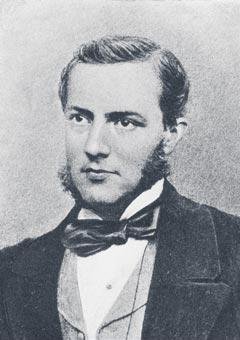
Max Muller
‐
Academic with interests in Sanskrit and the Vedas
Other names
Max Müller
Max Mueller
Friedrich Max Muller
Place of birth
Place of death
Oxford
About
Friedrich Max Müller was a Sanskritist at the University of Oxford in the late nineteenth century. Having spent some time in Paris, Müller travelled to London in 1846 for a short research trip. In 1848 he decided to settle in Oxford, having had his edition of Rig Veda printed by the University Press. He became a naturalized British citizen in 1855.
From 1851 Müller held various positions in the University of Oxford. In 1860 he competed against Monier Monier-Williams for the position of Boden Professor of Sanskrit. Although Müller's body of scholarship exceeded Monier-Williams', the issue of Müller's Liberal Lutheranism and German ethnicity came to the fore in the campaign and he was defeated by Monier-Williams. Despite the huge disappointment, Müller continued to pursue his studies in Sanskrit and the Vedas, and was widely known and respected in India.
Müller delivered a number of lectures and wrote many essays and books on Indian religion and spirituality. He cultivated a number of friendships with Indians through correspondence and their visits to Oxford. In particular, he became very close to Keshub Chunder Sen and interested in the Brahmo Samaj – which Müller saw as a natural sect of Christianity. He was also extremely concerned about the practice of child marriage in India, a concern he shared with Behramji Malabari and Pandita Ramabai, who both visited him in Oxford. Müller felt compelled to comment upon the case of the child-bride Rukhmabai by sending a letter to The Times in 1887.
R. C. Dutt, Nilakantha Goreh, Shyamaji Krishnavarma, Behramji Malabari, Monier Monier-Williams, P. C. Mozoomdar, Colonel Olcott, Pandita Ramabai, Rukhmabai, Keshub Chunder Sen, Satyendranath Tagore.
The Languages of the Seat of War in the East: With a Survey of the Three Families of Language, Semitic, Arian and Turanian (London: Williams & Norgate, 1855)
A History of Ancient Sanskrit Literature: So Far as It Illustrates the Primitive Religion of the Brahmans (London: Williams & Norgate, 1859)
Chips from a German Workshop (London: Longmans, 1867)
(trans. and ed.) The Sacred Books of the East, 51 vols (Oxford: Clarendon Press, 1879–1910)
The Science of Thought (London: Longmans, 1887)
Biographies of Words and the Home of the Aryas (London: Longmans, 1888)
Buddhist Mahâyâna Texts (Oxford: Clarendon Press, 1894)
Collected Works, 18 vols (London: Longmans, 1898)
My Autobiography: A Fragment (London: Longmans, 1901)
Bosch, Lourens van den, Friedrich Max Müller: A Life Devoted to Humanities (Leiden: Brill, 2002)
Chaudhuri, Nirad C., Scholar Extraordinary: The Life of Professor the Rt Hon. Friedrich Max Muller (London: Chatto & Windus, 1974)
Fynes, R. C. C., 'Müller, Friedrich Max (1823–1900)’, Oxford Dictionary of National Biography (Oxford University Press, 2007) [http://www.oxforddnb.com/view/article/18394]
Müller, Georgina (ed.) The Life and Letters of the Right Honourable Friedrich Max Müller (London: Longmans, 1902)
Stone, Jon R. (ed.) The Essential Max Müller (New York: Palgrave Macmillan, 2002)
Letters, notebooks and family papers, Bodleian Archives, Oxford
Image credit
Wikimedia Commons
